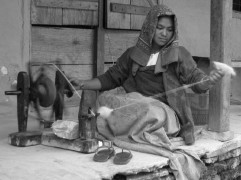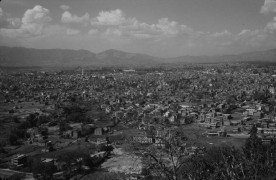
|

|
| Text and Context in Dialogue |

|

|
| Text and Context in Dialogue |
The Inside Story
The narrator of this story is one of three Tamang men whose ministries seem to have been greatly blessed by the Lord among their fellow people from the early days of the movement. The following narrative (edited for privacy, clarity and space) was related to the author at the narrator's residence.
In 1967 two translators arrived from Australia and travelled to Nuwakot where they asked the Chief District Officer (CDO) where there might be people who speak good Tamang language. He pointed them to our panchayat, where they met the Pradhan Panch (village headman). The Pradhan Panch brought them to my village where I was then teaching in the primary school. The Pradhan Panch told me I should work with them to teach them Tamang as I had a little English and was educated. At that time I had no knowledge of Christianity. The whole village had no knowledge of Christianity or of English. After a month back in Kathmandu the ladies returned to the village and began learning Tamang with me, paying me Rs 4 per day! In the second year, one of the ladies became seriously ill and had to return home. Another came from Scotland to replace her. Together, for the following 20 years, the three of us worked on the translation of the New Testament.

|
During this time I witnessed to my wife, mother, and father. My wife and mother came to faith fairly soon but it took a long time with much prayer before my father, who was the deputy Pradhan Panch and drank rakshi, accepted Christ. During that time also I began to pray for healing of my neighbours in my home. People would be healed in answer to prayer and by around 1970 ten households had come to Christ. I then taught the believers and gave them baptism. After some time opposition came from some ritual practitioners of a neighbouring village, who filed a report at the office of the CDO. The people of my own village, however, gave no opposition because one of the ladies was a nurse and taught me to help her do primary health care. People would line up each morning for medical attention, vaccinations etc. On receiving the report, though, the District Superintendent of Police (DSP) came with a unit to arrest both me, and my father. On their arrival there was much discussion. They noticed the village was so much better, cleaner and healthier. Nevertheless, the next morning the DSP arrested us and took us to the district centre where we were incarcerated for 10 days. |
The Pradhan Panch, however, a Brahman with a good reputation who had been re-elected to serve for another five years, came to the jail to argue for our release. They don't know anything about Buddhism anyway, he said. He told the police that we had done nothing wrong and had made the village better. There were now toilets etc. After vouching for our conduct he secured our release and told us to lie low for a while. The ladies, however, were expelled from the village by the CDO.
I restarted the fellowship but after some time another complaint was received and the police returned and arrested six of us and incarcerated us at the district centre for another 10 days. As before, however, the Pradhan Panch came and secured our release. In our village the people really wanted us to stay but in neighbouring villages believers were very harassed. This eventually led to a large migration from these villages to Lamoghora in Gorkha district. Land was cheap at Lamoghoda because the Daraundi River would often change course and take away the fields.
I was not keen on the migration. I felt that people should stay where they were and witness to their family and neighbours. Within a short time, however, all the believers but my family had migrated so it became impossible to keep a fellowship going. Eventually I too migrated to Kathmandu where I bought land and since then I have continued the work of Bible translation and literacy.
A honey bee goes to a flower to gather honey. While engaged in this delightful task, it is sometimes stung by a spider. This sting makes it numb, and the bee falls and easy prey for the spider. Likewise, Satan may attack us not only in evil places, but also while we are engaged in doing good, useful and pleasant work. If we are not prayerful, there is a danger of our being attacked and overwhelmed by Satan.
Sunder Singh, Reality and Religion